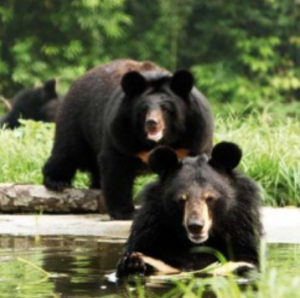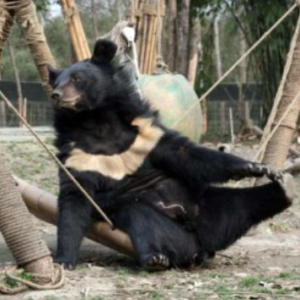About Bear: Springtime-Waking from Hibernation
The March sunshine warmed the air in Shenandoah National Park in Virginia as the black bear disentangled her muzzle from her forepaws and lifted her groggy head. She stretched out her legs, uncurling her body from the tight ball she’d slept in to keep from losing too much body heat. After months of inactivity, she stiffly straightened each limb to check that everything still worked. It did. She wasn’t affected by the ailments a person would’ve had after such a long slumber, like dehydration, kidney failure, bone loss, or gallstones. Indeed, knowing that, biologists often studied bears for help in solving human health problems ranging from osteoporosis to organ preservation to long-distance space travel.
The bear sow looked around. With a soft grunt, she pulled herself to her feet and stood unsteadily on her leathery, wrinkled pads. She wobbled and took a half-step for balance. She lowered her snout and shook herself … hard. Her stubby tail wiggled as months of dirt flew from her thick, dark fur.
She limped the short distance to the entrance of her makeshift den and gazed at the yellow-green around her. She couldn’t make out much detail. Her nearsightedness prevented that. But, no matter. Her nose would tell her what she needed to know. Her sense of smell was extremely keen, seven times better than a bloodhound’s and perhaps the best of any animal. She lifted her broad, narrow muzzle and sniffed at the mo ist soil, new buds and mouse scampering nearby. While the “smell” part of her brain was average-sized, her extra large nasal mucous membranes, 100 times that of a person’s, and vomeronasal organs in the roof of her mouth heightened her sensitivity. She yawned and took another whiff, detecting nothing that posed a danger. Now she could focus on her other bodily needs.
Although she’d lost nearly half her pre-hibernation weight, food wasn’t her top priority. She’d drink and get her system operating first. She trudged through the brush to a half-frozen river and waded in up to her shoulders. With her head at water level, she opened her mouth and vacuumed in as much water as possible. No dainty dog lapping for her. She stopped to breathe and lowered her head to gulp some more.

 Satiated at last, she lumbered out of the water and moved toward a thick stand of mountain laurel bushes. Her massive shoulders and thick limbs broadcast her strength to anyone watching. Every few steps she paused, dug a few roots, and put them delicately in her mouth. They’d help clear out her kidneys and digestive system. She hadn’t eaten anything since last fall. Instead, fat and protein from her muscles and organs had sustained her. Yet, unlike a person, her body hadn’t suffered. Instead, she’d recycled the nitrogen in her urea, a component of urine produced when tissues break down, to make new protein and restore her tissues. Good thing, too. If it had built up, it would’ve become toxic.
Satiated at last, she lumbered out of the water and moved toward a thick stand of mountain laurel bushes. Her massive shoulders and thick limbs broadcast her strength to anyone watching. Every few steps she paused, dug a few roots, and put them delicately in her mouth. They’d help clear out her kidneys and digestive system. She hadn’t eaten anything since last fall. Instead, fat and protein from her muscles and organs had sustained her. Yet, unlike a person, her body hadn’t suffered. Instead, she’d recycled the nitrogen in her urea, a component of urine produced when tissues break down, to make new protein and restore her tissues. Good thing, too. If it had built up, it would’ve become toxic.
She reached the bushes and sank down, her dark coat blending perfectly in the shadowy woods. Her fur resisted abrasion, too, so she couldn’t feel the scratches from the dense vegetation. She keeled onto her side to rest from the exertion. But she didn’t stay that way for long. A barrage of smells soon roused her, prompting her to haul herself back to her feet.
She rubbed against the smooth bark of a maple and stretched up to scratch at it with her short, hooked claws, leaving four parallel claw marks in their wake. Her forepaws had remarkable dexterity and, if given the opportunity, she could’ve opened anything from door latches to screw-top jars.
 Searching for more to nibble on, the bear sow rolled over an old stump. A cornucopia of insects scattered from the light. Now, her nearsightedness would be an advantage. Jaws apart in a half-grin, she scooped up a pawful and licked up the treats like a lollipop.
Searching for more to nibble on, the bear sow rolled over an old stump. A cornucopia of insects scattered from the light. Now, her nearsightedness would be an advantage. Jaws apart in a half-grin, she scooped up a pawful and licked up the treats like a lollipop.
